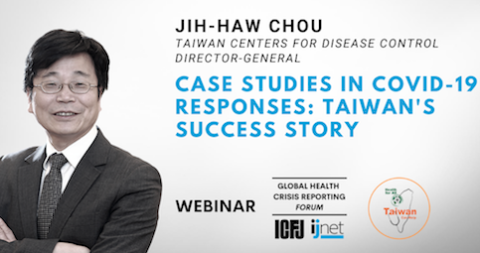
Join ICFJ and the Taipei Economic and Cultural Representative Office in the United States (TECRO) for a Q&A with the Director-General of the Taiwan Centers for Disease Control, Dr. Jih-haw Chou, moderated by ICFJ President Joyce Barnathan.
Across the strait from China, Taiwan should have been hit hard by the coronavirus. Instead, Taiwan is a resounding success story: In a country of 23 million people, it has seen only 485 cases and 7 deaths.
Having learned from its experience during the 2003 SARS epidemic that also began in China, Taiwan used advanced technology and effective coordination between its public and private sectors to thwart the spread of COVID-19. Now, it is almost back to normal, with relatively little damage to the overall economy. U.S. Secretary for Health and Human Services Alex Azar has visited Taiwan to see for himself the remarkable results.
In this special event, Dr. Jih-haw Chou, Director-General of the Taiwan Centers for Disease Control, who will talk through an interpreter about what others can learn from Taiwan’s experience.
Date: August 18, 2020
Time: 08:00 AM ET
Register here: https://us02web.zoom.us/webinar/register/WN_I6UHeaeYR1e4Ssa3VyDLNA